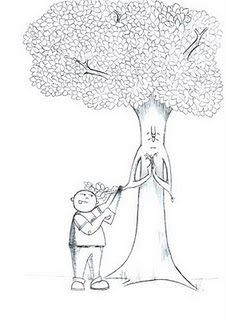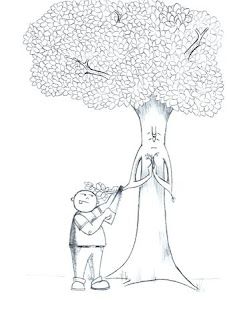Queridos devotos:
Todas las glorias a Srila Prabhupada.
Para más información sobre Su Santidad Srila Gunagrahi das Goswami Maharaja por favor visiten www.gunagrahidasgoswami.org
¡Hare Krishna!
¡NUEVO WEBSITE!
NEW WEBSITE!
Dear devotees:
All glories to Srila Prabhupada.
For more information on His Holiness Srila Gunagrahi das Goswami Maharaja please visit www.gunagrahidasgoswami.org
Hare Krishna!
UNA COMPRENSION MAS PROFUNDA
 18 de diciembre, 2009
18 de diciembre, 2009
He estado pensando mucho en el asunto que discutimos en nuestro último post (19 de noviembre) y me gustaría presentar algunos pensamientos adicionales que nos ayudarán a profundizar más en el tema.
Con el correr de los años, he visto que nuestro progreso personal y el progreso de nuestro movimiento a menudo terminan estancado debido a nuestra incapacidad de tratar apropiadamente con nuestras emociones negativas respecto a los demás. Por otro lado, también he experimentado como, cuando el resentimiento y otros malos sentimientos muestran sus rostros en el día a día de nuestras vidas, si son tratados con madurez espiritual, entonces pueden modificarse en una fuerza positiva de transformación para todos nosotros. Y de esta manera, nuestro movimiento puede avanzar del modo en que debería.
Si se toman el tiempo de leer nuevamente la cita de Srila Bhaktisiddhanta Saraswati Thakur incluida en el post anterior respecto al perdón, y si lo comparan con el significado de Prabhupada del BG 12.12-13 presentado aquí, verán que buena parte del mensaje es identico. Prabhupada dice: "Un devoto puro nunca es perturbado bajo ninguna circunstancia. Ni es envidioso de nadie. Tampoco un devoto se vuelve el enemigo de su enemigo; él piensa, "Esta persona esta actuando como mi enemiga debido a mis fechorías pasadas. Entonces es mejor sufrir que protestar."
En El Srimad-Bhagavatam (10.14.8) se declara: tat te'nukampam su samiksamano bhunjana evatma kirtam vipakam. Cuando un devoto esta angustiado o ha caído en alguna dificultad, él siempre piensa que es por la misericordia del Señor. Él piensa, "Gracias a mis fechorías pasadas yo debería sufrir mucho, mucho más de lo que estoy sufriendo ahora. Es debido a la misericordia del Señor Supremo que no estoy recibiendo todo el castigo que merezco. Sólo estoy recibiendo un poco por la misericordia de la Suprema Personalidad de Dios." Por lo tanto, él siempre esta calmado, callado y paciente a pesar de cualquier situación angustiosa. Un devoto siempre es amable con todos, incluso con su enemigo.
Aunque he leído muchas veces estas palabras de arriba, cuando llegué a ellas recientemente tuvieron más significado para mí que nunca antes. Quizás necesitaba leer primero la cita de Bhaktisiddhanta Saraswati Thakur para comprender mejor los puntos de Prabhupada. No sólo nos enseñan que la adversidad inflingida por otros proviene de nuestras propias fechorías - y no de los demás - sino también que la adversidad es minimizada en gran parte por la misericordia de Krsna. Por lo tanto, debemos intentar llegar al punto de sentir alivio y gratitud por lo que nos esta sucediendo, no frustración y resentimiento. Justo como cuando un juez nos ayuda a comprender que somos claramente culpables de una infracción, pero nos dice que, por nuestro buen comportamiento, sólo nos cobrará una fracción de la multa que normalmente deberíamos pagar.
Aquí hay otra comprensión valiosa que podemos obtener al ser maltratados u ofendidos. Puede ser difícil de incorporar a nuestras vidas diarias, pero si lo hacemos, seremos capaces de sentir gran alegría y alivio: cuando pensemos en aquellos que nos han demostrado animosidad, debemos intentar sentir compasión hacía ellos sabiendo que su comportamiento hacía nosotros les causará el mismo sufrimiento que nosotros atravesamos ahora debido a nuestro idéntico mal comportamiento en el pasado. Nuestra meta debería ser desechar cualquier resentimiento hacía tales personas y tener simpatía por ellas, satisfaciendo así nuestro mandato de ser un amable amigo para todos, incluso nuestro enemigo.
Nuestro único enemigo, entonces, es el enemigo interior, nuestra propia ignorancia que nos impulsa a actuar y pensar de tantas formas destructivas, causándonos tanto dolor en el futuro. Si reconocemos y focalizamos en eso, nuestra enemistad hacía otros pronto desaparecerá y dejará abierta la puerta de par en par para que el amor llene nuestros corazones, sin importar las acciones de los demás o su mentalidad hacía nosotros.
A DEEPER UNDERSTANDING
 December 18, 2009
December 18, 2009
I have been thinking a lot about the subject matter that we discussed in the last post (Nov. 19th) and would like to present a few more thoughts that could help us go deeper.
I have seen over the years that our personal progress and the progress of our movement is often checked due to our inability to cope properly with our negative emotions towards each other. On the other hand, I have also experienced how, when resentment and other ill feelings show their face in our day-to-day lives, if they are handled with spiritual maturity, they can be turned into a powerful source of positive transformation for all of us. And in this way our movement can go forward as it is meant to.
If you take the time to again read the quote by Srila Bhaktisiddhanta Saraswati Thakur included in the post below on forgiveness, and if you compare it to Prabhupada's purport of BG 12.12-13 presented here, you will see that much of the message is identical. Prabhupada says: "A pure devotee is never disturbed in any circumstances. Nor is he envious of anyone. Nor does a devotee become his enemy's enemy; he thinks, "This person is acting as my enemy due to my own past misdeeds. So it is better to suffer than to protest."
In the Srimad-Bhagavatam (10.14.8) it is stated: tat te'nukampam su samiksamano bhunjana evatma kirtam vipakam. Whenever a devotee is in distress or has fallen into difficulty, he thinks that it is the Lord's mercy upon him. He thinks, "Thanks to my past misdeeds I should suffer far, far greater than I am suffering now. So it is by the mercy of the Supreme Lord that I am not getting all the punishment I am due. I am just getting a little, by the mercy of the Supreme Personality of Godhead." Therefore he is always calm, quiet and patient, despite many distressful conditions. A devotee is also always kind to everyone, even to his enemy.
Although I had read the above words many times, when I recently came across them they had more meaning to me than ever before. Perhaps I needed to read the quote by Bhaktisiddhanta Saraswati Thakur first to bring Prabhupada's points further home. Not only are we being taught by them that adversity brought upon us by others comes about because of our own misdeeds - not theirs - but also that that adversity is being greatly minimized due to Krsna's mercy. Thus we should try to come to the point of feeling relief and gratitude for what is taking place, not frustration and resentment. Just like when a judge helps us understand that we are clearly guilty of an infraction but tells us that, because of our good behavior, he will only charge a fraction of the fine we would ordinarily have to pay.
There is another valuable understanding we can gain from being treated badly or offended. It might be difficult to incorporate into our daily lives, but if we do, we will be able to feel great joy and relief: when thinking of those who have shown us animosity, we should try to feel compassion towards them, knowing that their inimical behavior towards us will cause them the same suffering that we are now undergoing due to our identical ill behavior in the past. Our goal should thus be to cast out any resentment towards such persons and have sympathy for them, thus fulfilling our mandate to be a kind friend to everyone, even our enemy.
Our only enemy, then, is the enemy within, our own ignorance, which causes us to act and think in so many destructive ways, bringing on so much future pain. If we recongnize and focus on that, our enmity towards others will soon go away and leave the door wide open for love to fill our hearts, regardless of anyone's actions or mentality towards us.
PERDONAR ES UNA GRAN VIRTUD
 19 de noviembre, 2009
19 de noviembre, 2009
Aquí hay una cita muy útil para todos nosotros.
SB 11.23.5:
TRADUCCION
Una vez, cierto sannyasi fue insultado de muchas maneras por hombres impíos. Sin embargo, con determinación él recordó que estaba sufriendo los frutos de su propio karma previo. Les narraré esta historia y les diré lo que habló.
SIGNIFICADO
Srila Bhaktisiddhanta Sarasvati Thakura comenta lo siguiente. "Usualmente, aquellos que abandonan el camino del materialismo y se dedican a la renunciación son atacados por personas impías. Este análisis, sin embargo, es superficial, pues el castigo es en realidad el resultado acumulativo del karma previo de uno. Algunos renunciantes demuestran una falta de tolerancia frente a los remanentes de sus pecados previos y por lo tanto son obligados a ingresar nuevamente al sendero de una vida impía. Sri Caitanya Mahaprabhu nos instruye entonces que uno debe volverse tan tolerante como un árbol. Si un neófito en el camino del servicio devocional a los devotos puros del Señor es atacado por personas envidiosas, él debe aceptar esto como una consecuencia de sus actividades fruitivas previas. Uno debe ser inteligente y evitar futuras infelicidades al rechazar la ética del ojo por ojo, diente por diente. Si uno reusa entrar en enemistad con hombres envidiosos, ellos automáticamente lo dejarán tranquilo."
De esta cita podemos entender que si nos enojamos al ser insultados, debemos saber que nuestra ira debe dirigirse a la verdadera causa del problema, y esa causa no es la persona que nos ofendió. En este caso, tampoco es Krsna, quien esta sancionando y permitiendo las acciones de esa persona. Mejor dicho, la causa no es otra que nosotros mismos. Ciertamente no es sencillo ver las cosas de este modo, en especial cuando sentimos el dolor de las palabras o acciones del otro, y cuando hemos estado atrapados en patrones de pensamiento ilusorio durante un largo tiempo. Por lo tanto, es necesario entrenamiento y purificación para desarrollar una visión apropiada, y nos han dado, para ello, guru, sadhu, y sastra para saturar nuestra conciencia condicionada con la verdad.
Pero, si llegamos al punto de permitirnos ver que en verdad somos culpables de nuestras miserias, ¿hay algún valor en estar enojados con nosotros mismos? ¿Debemos gastar nuestro tiempo lamentándonos y pensando en nosotros mismos de un modo negativo? Prabhupada nos dice que realmente es apropiado sentir vergüenza por nuestras transgresiones del pasado, pero sólo hasta un punto práctico. Debemos enfocar en perdonarnos a nosotros mismos, del mismo modo que sabemos qué tan importante es perdonar a los demás. Podemos dejar a un lado nuestros dolores y enojos propios, y tener la fuerza para avanzar en nuestro servicio con una actitud positiva y un corazón sin lastre.
Nuestro ego falso lucha contra la posibilidad de poner en práctica lo arriba mencionado, pero no hay límites al beneficio que podemos obtener de ello. El perdonar es una gran virtud sin la cual ningún verdadero devoto puede vivir.
FORGIVING IS A GREAT VIRTUE
 November 19, 2009
November 19, 2009
Here is a very useful quote for all of us.
SB 11.23.5:
TRANSLATION
Once a certain sannyasi was insulted in many ways by impious men. However, with determination he remembered that he was suffering the fruit of his own previous karma. I will narrate to you his story and that which he spoke.
PURPORT
Srila Bhaktisiddhanta Sarasvati Thakura comments as follows. "Often those who give up the materialistic path and devote themselves to renunciation are attacked by impious persons. This analysis, however, is superficial, since the punishment is actually the cumulative result of one's past karma. Some renunciants show lack of tolerance when presented with the remnants of their previous sins and thus are forced to enter again onto the path of impious life. Sri Caitanya Mahaprabhu therefore instructs that one should become as tolerant as a tree. If a neophyte on the path of devotional service to the Lord's pure devotees is attacked by envious persons, he must accept it as a consequence of his previous fruitive activities. One should be intelligent and avoid future unhappiness by rejecting the ethic of an eye for an eye, a tooth for a tooth. If one refuses to enter into enmity with envious men, they will automatically leave him alone."
From this quote we can understand that if we become angry upon being insulted, we should know that our anger should be directed at the actual cause of the problem, and that cause is not the person who offended us. Nor is it Krsna, for that matter, who is sanctioning and enabling that person's actions. Rather, the cause is none other than our very selves. It is certainly not easy to see things in that way, especially when we are feeling the pain of another's words or actions and when we have been steeped in illusory thought patterns for a very long time. Thus, it takes training and purification to develop the proper vision, and we have, therefore, been given guru, sadhu, and sastra to saturate our conditioned consciousness with the truth.
But, if we can come to the point of allowing ourselves to see that we are in fact to blame for our miseries, is there value in being angry with ourselves? And should we spend our time lamenting and thinking of ourselves in a negative way? Prabhupada does tell us it is indeed proper to feel shame for our past transgressions, but only up to a practical point. We should mainly focus on forgiving ourselves, just as we know how important it is to forgive others. We can then put aside our pain and self anger and have the strength go forward in our service with a posititve attitude and unburdened heart.
Our false egos struggle against our putting all of the above into action, but there is no limit to the amount we can benefit by doing so. Forgiving is a great virtue that no true devotee can live without.
ASOCIACION CON LOS SADHUS
 6 de noviembre, 2009
6 de noviembre, 2009
Prabhupada dice en el significado del verso 24 de "Las enseñanzas del Señor Kapila": En vez de pensar: "Si no me tomo un trago, me volveré loco", tenemos que pensar: "Si no encuentro un sadhu, me volveré loco".
Antes de conocer a los devotos, yo en verdad era un loco que frenéticamente buscaba la felicidad material. Años más tarde, en los 90's, Lokanatha Swami y yo estábamos juntos mirando asombrados como cientos de jóvenes disfrutadores de los sentidos estaban siendo transformados por cantar y bailar en éxtasis en un festival. Él se volvió hacía mi y enfáticamente declaró, "¡¡¡¡¡Gracias a Dios por Srila Prabhupada!!!!!"
Hoy, las palabras de Maharaja retumban en mi mente y bailan en mi lengua, pues en este mismo día, un 6 de noviembre, hace exactamente 40 años, yo decidí recuperar mi cordura al unirme a los devotos en el templo y sumergirme en el servicio devocional. Sí, "Gracias a Dios por Srila Prabhupada".
Y también le doy gracias a Él por los santos hijos y las santas hijas de Srila Prabhupada, quienes tan paciente y amorosamente me echaron una mano y me llevaron hasta su trascendental familia. Recuerdo que la atmósfera en el templo era tan pura y atractiva que incluso esta alma tan caída se convenció de nunca irse y regresar a la intoxicante locura del mundo material.
De un modo u otro, a pesar de mis innumerables ofensas, Krsna aun me mantiene bajo Su refugio. Eso es todo debido a la divina misericordia de Srila Prabhupada y su séquito de devotos, jóvenes y viejos. Oro por nunca perder su compañía.
ASSOCIATION WITH THE SADHUS
 November 6, 2009
November 6, 2009
Prabhupada says in the purport of verse 24 of "The Teachings of Lord Kapila": Instead of thinking, “Unless I have a drink, I will go mad,” one should think, “Unless I associate with a sadhu, I will go mad.”
Before meeting the devotees I was indeed a madman who was frantically searching for material happiness. Years later, in the 90's, Lokanatha Swami and I were together watching in amazement how hundreds of young sense enjoyers were being transformed by dancing and chanting in ecstacy at a festival. He turned to me and emphatically declared, "Thank God for Srila Prabhupada!!!!!"
Today, Maharaja's words are echoing in my mind and dancing on my toungue, for it was on this day, November 6th, exactly 40 years ago, that I decided to regain my sanity by joining with the devotees in the temple and immersing myself in devotional service. Yes, "Thank God for Srila Prabhupada".
And thank Him as well for Srila Prabhupada's saintly sons and daughters, who so patiently and lovingly reached out to me and brought me into their transcendental family. I remember the atmosphere in the temple being so pure and attractive that even this most fallen soul became convinced he would never want to leave and return to the intoxicating madness of the material world.
Somehow or other, in spite of my innumerable offenses, Krsna is still keeping me under His shelter. That is all due to the divine mercy of Srila Prabhupada and his entourage of devotees, young and old. I pray to never lose their company.
LA IMPORTANCIA DE ESCRIBIR
 2 de noviembre, 2009
2 de noviembre, 2009
Durante una clase en 1972, Srila Prabhupada nos instruyó:
"Cada uno de ustedes, ¿cuáles son sus realizaciones? Ustedes escriban sus realizaciones — qué han realizado acerca de Krsna. Eso es requerido. No es pasivo; ustedes siempre deben ser activos. Cuando encuentren un tiempo, escriban. No importa — dos líneas, cuatro líneas, pero escriban sus realizaciones. Srvananam kirtanam — escribiendo o ofreciendo oraciones, glorias — esta es una de las funciones de un Vaisnava [devoto]. Ustedes están escuchando, pero deben escribir también. Entonces, escribir significa smaranam — recordar qué han oído del maestro espiritual, de las escrituras."
Hace unos días subí una entrada acerca de escribir canciones y poesía. Arriba vemos que Prabhupada glorifica a la escritura en general y anima a todos sus seguidores a adoptarla. Él nos explica que escribir automaticamente involucra al devoto en tres de los aspectos más potentes del servicio devocional: escuchar y cantar acerca de Krishna y también recordarlo [sravanam, kirtanam, smaranam]. Por lo tanto, es un maravilloso ejercicio que nos permite focalizar muy especifica y profundamente en temas relacionados con Krsna, y así purificarnos. Apenas con pensar en tópicos trascendentales sin siquiera escribir acerca de ellos, por supuesto, ya nos estamos purificando; qué decir de hablar acerca de estos temas. Pero la ventaja puntual de escribir es que nos ayuda a disminuir la velocidad de nuestro pensar para que podamos organizar y solidificar nuestros pensamientos de una forma concisa, cohesiva y atractiva. Y luego, como estas realizaciones están disponibles para la lectura, pueden ser una fuente continua de inspiración para nosotros mismos y quizás para otros también. A través de los años, he visto que muchos devotos han tenido la oportunidad de leer con gran interés lo que previamente habían escrito, pero luego olvidado. Es como descubrir una parte de nosotros que habíamos perdido y alegrarnos mucho por haberla encontrado otra vez.
En estos días no he dado clases ni hablado mucho debido a que mis cuerdas vocales han estado de paro por un tiempo. Krsna muy amablemente me ha ubicado en esta posición; primero, para inspirarme a escribir de una manera más formal. A veces es difícil para mi ingresar a un modo apropiado de concentración, pero con algo de esfuerzo puedo usualmente superar las barreras mentales y encontrarme en un reino de absoción que resulta bastante disfrutable. De forma similar, frecuentemente he visto devotos retrasar o dejar para después tareas como escribir sus ofrendas Vyasa Puja para Prabhupada o sus maestros espirituales. Pero al final, ellos siempre expresan qué tan satisfactorio resultó poder finalmente sentarse, dejar todo lo demás de lado, y volcar los sentimientos en sus corazones.
No hay duda sobre ello, conciencia de Krishna, tal como nos lo otorga Prabhupada, realmente funciona y es en verdad sublime. Su-sukham kartum avyayam. "Es eterno, y se ejecuta con alegría." Bg. 9.2
THE IMPORTANCE OF WRITING
 November 2, 2009
November 2, 2009
During a lecture in 1972, Srila Prabhupada instructed us:
Every one of you, what is your realization? You write your realization — what you have realized about Krsna. That is required. It is not passive; always you should be active. Whenever you find time, write. Never mind — two lines, four lines, but you write your realizations. Srvananam kirtanam — writing or offering prayers, glories —this is one of the functions of a Vaisnava [devotee]. You are hearing, but you have to write also. Then, writing means smaranam — remembering what you have heard from your spiritual master, from the scripture."
Some days ago, I posted an entry about writing songs and poetry. Above we see that Prabhupada is glorifying writing in general and encouraging all his followers to take it up. He is explaining that writing automatically involves a devotee in three of the most potent aspects of devotional service: hearing and chanting about Krishna and remembering Him [sravanam, kirtanam, smaranam]. Thus it is a wonderful exercise and enables us to focus very specifically and deeply on topics related to Krsna and become purified. Merely thinking about transcendental topics even without writing about them is, of course, also purifying, what to speak of talking about them. But the unique advantage of writing is that it helps us to slow down our thinking so that we can organize and solidify our thoughts in a concise, cohesive, and attractive manner. And later on, because those realizations will be available for reading, they can provide a continued source of inspiration for ourselves and perhaps others as well. Througout the years, I have seen that many devotees have had occassion to read with great interest what they previously wrote down, but later forgot. It is like discovering a part of ourselves that we have lost and are very happy to find again.
Nowadays, I have not been giving classes or speaking very much due to my vocal cords going on strike for a while. Krsna has so kindly put me in this position, for one, to inspire me to take up writing in a more formal way. At times it is difficult for me to enter into the proper mood of concentation, but with some effort I can usually overcome the mental barriers and find myself in a realm of absorbtion that is quite relishable. Similarly, I have often seen devotees procrastinate quite a bit when faced with the task of writing their Vyasa Puja offerings to Prabhupada or their spiritual master. But in the end they always say how satisfying it was to have finally been able to sit down, put everything else aside, and pour out their heartfelt feelings.
There is no doubt about it, Krishna consciousness as Prabhupada is giving it to us actually works and is quite sublime. Su-sukham kartum avyayam. "It is everlasting, and it is joyfully performed." Bg. 9.2
